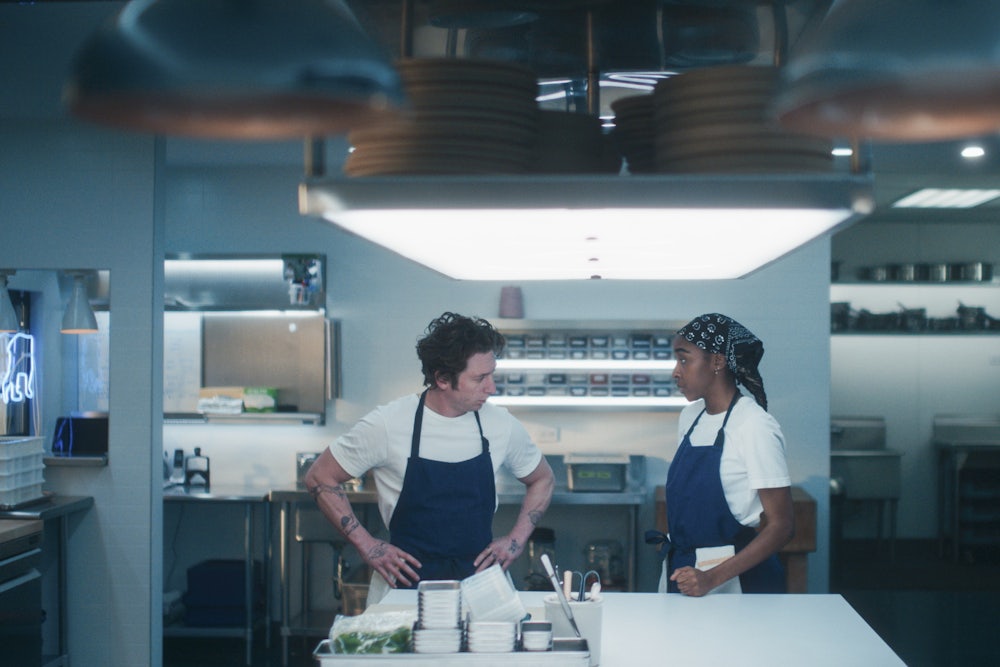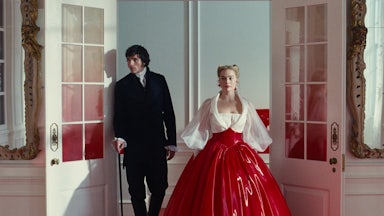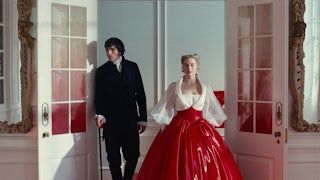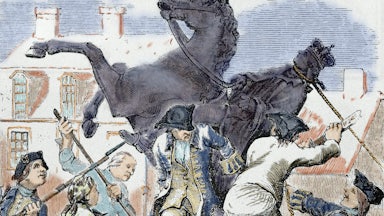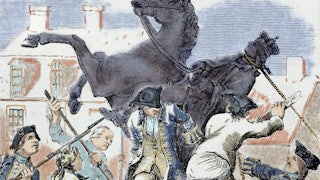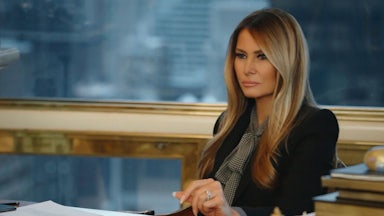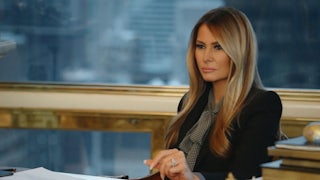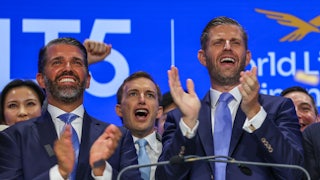It’s hard to know what’s scarier: the past or the future. In this fourth season of The Bear, we’ve seen characters go back and forth on this question. Some are gripped by anxiety about days gone by. Sugar (Abby Elliott) can’t get over an unspecified beef with her former best friend; Donna Berzatto (Jamie Lee Curtis) can’t get over the loss of her beloved son Mikey, and the role her anger and alcoholism might have played in his eventual breakdown; and of course Carmy (Jeremy Allen White), in a new, disarmingly reflective mood, can’t stop saying “I’m sorry” to everybody he meets for all of his past misdeeds.
But the future is also a minefield. Sydney (Ayo Edebiri) is paralyzed with indecision about whether she ought to tether herself to Carmy and their floundering restaurant or accept an offer to start again in a new spot; Richie (Ebon Moss-Bachrach) is terrified that his ex’s remarriage will mean that he’s written out of his daughter’s life; and, of course, the whole season is haunted by a big cinder block of a digital clock that’s counting down the seconds until the money runs out. The past is a nightmare, the future an apocalyptic vision. This is true for these characters and, to some extent, for the show they’re on too.
The Bear, which was just greenlit for a fifth season, belongs to a long line of prestige television series that are kind of about themselves. The Wire was a show that tried to narrate and understand the sprawling network of individuals and institutions that made up the city of Baltimore, and it was about a group of people who were trying to narrate and understand the sprawling network of individuals and institutions that made up the city of Baltimore. The characters’ struggle was also the writers’ struggle. Better Call Saul and The Leftovers dealt subtly with the legacy of their creators’ prior hits (Breaking Bad and Lost, respectively). And, of course, there was Mad Men, a show about the drama of being an ambitious storyteller making art in a commercial medium for consumers who won’t always understand. Mad Men’s bravura kind of self-consciousness could grate on occasion, but it could also transform relatively low-stakes office drama into genuinely, thrillingly surprising beats.
The Bear is a strange cousin to these shows. While the show’s knockout first season was, loosely, about an artist thrumming with ideas trying to make something for himself, the show has only become more self-conscious as it’s gone on, almost compulsively so. Season 2—the series’ best so far—which gut-renovated and reimagined the successful first season, was about gut-renovating and reimagining the restaurant. Season 3 was about the pressure of living up to phenomenal success. And now, season 4—following up on a less-well-reviewed third season—is about contending with failure, making amends, figuring out a new way forward.
So the show is about itself in time. In the hands of creator Christopher Storer and showrunner Joanna Calo, The Bear seems conscious of its own past, its long arc of ambition. But it also seems uncannily and twitchily aware that it doesn’t always make the best decisions. On occasion, this intense inward focus leverages the show into transcendence. But often the show’s self-critique merely makes explicit the problem with the episode of television you’re currently watching. (Last summer, in Slate, Sam Adams wrote a review with the memorable headline, “This Season of The Bear is About What’s Wrong with This Season of The Bear.”) While Sydney and Richie and Donna and Sugar and Carmy all manage to, at least temporarily, resolve their anxieties about the past and the future, The Bear itself seems stuck between them. What was this show? What is it doing? What might it become?
Appropriately, season 4 begins in the wake of a (mostly) bad review. The long-awaited Chicago Tribune write-up offers some praise for the technical brilliance of Syd and Carmy’s cuisine and for the timeless tastiness of the Italian Beef sandwiches they still serve out of a back window, but the critic lambasts the restaurant for its chaotic style and inconsistency. “Dissonance” is the word that keeps ringing in our characters’ ears. The review was teased in the final episode of last summer’s third season. It was odd, at the time, for the show to seem to prophetically acknowledge the criticisms I had as a viewer. Coming off of one of best single seasons of television I’ve seen this decade (I rewatched it this summer, and it still rips) the third season was a disappointment. Scattered and meandering where the second season was propulsive, maudlin where the second season had been moving, far too in love with its flashiest and least interesting flourishes—in particular, Carmy’s traumatic memories of a tyrannical mentor chef—what you could make out of the review of The Bear seemed just about right for a review of The Bear.
Season 4 seems hell-bent on taking that criticism. While there’s still plenty of self-indulgence, the show has pared itself down, trying to focus on what works. What that means, though, is that The Bear focuses on what has worked. This fourth season is a real set of classic covers. As in the second season, a ticking clock lends force and drama to every second of interaction. There’s a gorgeous stand-alone episode written by Edebiri (with Lionel Boyce), mirroring last season’s standout Edebiri production. There’s an extra-long, extra-shouty Berzatto family episode, mirroring season 2’s legendary cameo-stravaganza “Fishes.” Then, there’s the fleet of fan service ships docking on the shores of Lake Michigan: Richie and Chef Jess (Sarah Ramos) reignite their chemistry from season 2’s exceptional “Forks”; so do pastry chef Marcus (Boyce) and handsome, inked mentor Luca (Will Poulter), and we return to the will-they-won’t-they around Carmy and his former love Claire (Molly Gordon). One of the big changes that happens at The Bear this season is that Carmy agrees to have a set menu, rather than one that changes every night. (Having a set menu cuts costs, but it also helps the restaurant find the kind of identity that the Tribune reviewer thought it lacked.) He hands Sydney a draft and says it’s a “greatest hits.” Too true.
It works, to some extent. The Edebiri episode, in which Sydney gets her hair braided by her cousin Chantel (Danielle Deadwyler), is a series highlight. Deadwyler is extraordinary, Edebiri is as funny as she’s been on this show, and the episode is helmed by guest director Janicza Bravo with a kind of economical cool that feels refreshing amid the nosy extreme close-ups that characterize Storer’s house style as a director. Likewise, the returning characters each bring something new to the table, or at least serve to intensify a good flavor that was already there. The return of Ramos as a scene partner for Moss-Bachrach is welcome, in part because she’s such an appealing talent in her own right—true heads remember her as scene-stealing teenager Hattie on Parenthood—but also because her presence gives more space for Moss-Bachrach to deepen what’s already the most emotionally complex performance on the show. Likewise, Poulter helps shine a spotlight on Boyce, who doesn’t have a lot to do this season but always makes the most of his screen time.
But there are diminishing returns elsewhere. The big Berzatto episode doesn’t earn its run time—an hour and nine minutes!—and it fails to capture the chaos magic that made “Fishes” so unique. The cameos are too fast and frequent to mean much, and, while I have no investment in the comedy-versus-drama debate that perennially hangs over this show, it was an episode that felt like it needed to be meaningfully funnier to really work as a companion piece to its grim ancestor. And it highlights another stubborn problem: The show doesn’t really know what to do with Curtis’s gargantuan performance as Donna, the alcoholic, verbally abusive matriarch of the Berzatto clan. Her debut performance in “Fishes” is a genuine spectacle, a dark aria that’s hard to forget. But, despite bringing her back on a redemption tour for an episode each of these past two seasons, the camera is oddly ungenerous to her. Storer continues to shoot her in a way that almost fetishizes her wrinkles, her pancake makeup, her scarifying physicality. Bob Odenkirk doesn’t look like that, nor Oliver Platt, nor even Rob Reiner. The show is so insistent on exploring the crevasses of Curtis’ face, it makes you think it’s searching for an insight. I’m not sure it has one.
Of all the conspicuously self-conscious TV shows, I think The Bear might ultimately have the most in common with Ted Lasso. Both shows are about idiosyncratic geniuses with absent fathers who infect the people who surround them with their contagious spirit (Ted’s is positive, while Carmy’s, obviously, is negative); both are about ragtag fellowships that transform into chosen family; both are about lives lived under intense pressure. And both are relentlessly self-aware and self-referential. But, in both cases, rather than a postmodern chill, the show’s spiraling self-reflexivity produces, instead, an excess of sentimentality.
This isn’t new. In fact, The Bear’s near-constant emotional availability is one of its hallmarks and, occasionally, a great strength. Think about Richie screaming, “I fucking love you,” at Carmy through a locked refrigerator door, or how frequently friends— especially male friends—have to loudly and explicitly affirm their friendship to each other, or the beaming smile on Tina’s (Liza Colón-Zayas) face when we see her finally find a home at Mikey’s Original Beef in last season’s flashback episode. People don’t yell at each other like this, they don’t crank the Taylor Swift that loud on the car stereo, if their hearts aren’t filled to bursting.
But this season, the show’s emotions feel pushy. One character in seemingly every conversation has a paradigm-shifting epiphany, tells or realizes a long-hidden truth. Carmy has decided to become open to those he loves by saying “I’m sorry” to all of them. It shouldn’t be enough, to simply say that, but, over and over, we see the proof that Carmy’s apology tour is working. Even with the hardest cases—with Claire, with Donna—the sorrys thaw the ice. Storer and Calo seem to think that they, too, can be absolved of their missteps with enough emotional effort.
It’s striking to watch a show like this, that features a negative review as a key plot point, and never once feel that the critic is being villainized. In our era of the Tomatometer and hard lines between audience scores and critic scores, it’s rare to encounter a TV or film artist whose commentary on criticism isn’t about dismissal or resentment. This show is radically open to its own failure. Nobody in the show, nobody, even, who’s making the show, thrashes against this critique or condescends to it. They hear it, they cite it chapter and verse, they see themselves in it. And, in attending to that critique—that’s coming from inside the house!—this season recaptures something of what has been lost about this show. But The Bear doesn’t need to apologize, and, regardless, its apologies aren’t enough. The Bear needs to move forward, to gut-renovate, to reimagine itself boldly yet again. The finale teases us with the possibility that it just might do that. Sorry. Not sorry.
